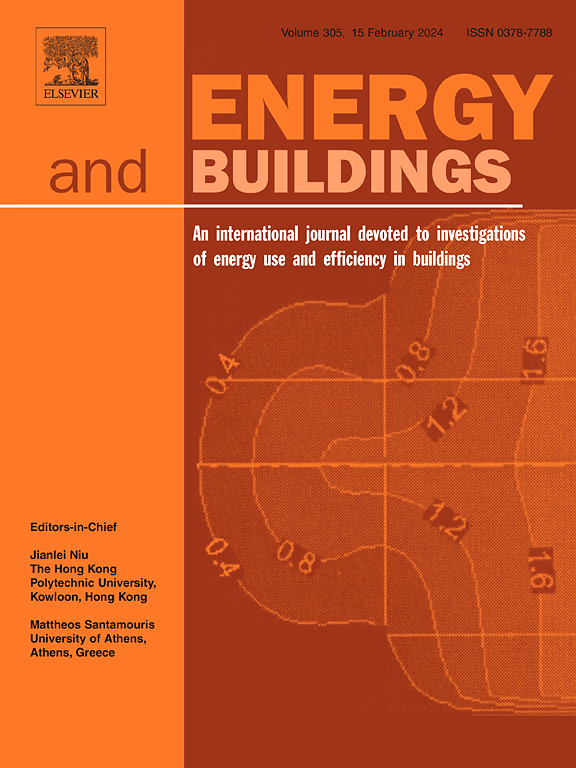Comprehensive performance evaluations of heating system recycling waste heat from data center using multi-objective optimization method
IF 7.1
2区 工程技术
Q1 CONSTRUCTION & BUILDING TECHNOLOGY
引用次数: 0
Abstract
Recycling waste heat from data center for heating is an effective approach to realize waste heat recovery and carbon reduction. Transcritical carbon dioxide heat pump serves as a key technology in this process. However, the thermodynamic, economic, and environmental performance of this heating scheme competes obviously. Achieving a reasonable tradeoff among different performance pursuits is crucial, but it is unclear. This work optimizes the comprehensive performance of this heating scheme in various scenarios using multi-objective optimization method. Optimal tradeoff results of thermodynamic, economic, and environmental performance were obtained. Effects of heating temperature and heating duration on tradeoff results were analyzed. Performance differences between multi-objective tradeoffs and single-objective optimums are quantitatively compared. Results indicate that the tradeoff between thermodynamic and economic performance deteriorates with increasing heating temperature, whereas the balanced environmental performance enhances. Longer heating duration improves the economic-environmental balances but causes noticeable fluctuations in thermodynamic performance. Tri-objective tradeoff well balances different performance pursuits, but the tradeoffs will worsen remarkably compared to optimal single-objective results, where the coefficient of performance (COP) and annual reduction emission (ARE) decrease by 11.4 %, and 33.4 % at most, respectively; and levelized cost of heat (LCOH) increases by 176.7 %. Nevertheless, the comprehensive performance of system is attractive, with the balanced COP, LCOH, and ARE can be 3.62, 0.019 $/kWh, and 22,822 t, respectively; presenting financially feasible with significant energy saving and carbon reduction effects. Proposed heating scheme is particularly suitable for scenarios with long heating duration and low heating temperature, where the comprehensive benefits are larger.
基于多目标优化方法的数据中心余热回收供暖系统综合性能评价
回收数据中心余热供热是实现余热回收和减碳的有效途径。跨临界二氧化碳热泵是这一过程的关键技术。然而,这种供暖方案在热力学、经济和环境性能方面存在明显的竞争。在不同的性能追求之间实现合理的权衡是至关重要的,但目前还不清楚。本文采用多目标优化方法对该供热方案在各种场景下的综合性能进行了优化。获得了热力学、经济和环境性能的最佳权衡结果。分析了加热温度和加热时间对权衡结果的影响。定量比较了多目标权衡和单目标优化之间的性能差异。结果表明,随着加热温度的升高,热力性能和经济性能之间的权衡恶化,而平衡的环境性能增强。较长的加热时间改善了经济与环境的平衡,但会引起热力学性能的明显波动。三目标权衡可以很好地平衡不同的绩效追求,但与最优单目标结果相比,权衡会显著恶化,其中绩效系数(COP)和年减排(ARE)最多分别下降11.4% %和33.4% %;平准化热成本(LCOH)增加176.7 %。然而,系统的综合性能是有吸引力的,平衡COP、LCOH和ARE分别可以达到3.62、0.019 $/kWh和22,822 t;经济上可行,节能减排效果显著。建议的采暖方案特别适用于采暖持续时间长、采暖温度低、综合效益较大的场景。
本文章由计算机程序翻译,如有差异,请以英文原文为准。
求助全文
约1分钟内获得全文
求助全文
来源期刊

Energy and Buildings
工程技术-工程:土木
CiteScore
12.70
自引率
11.90%
发文量
863
审稿时长
38 days
期刊介绍:
An international journal devoted to investigations of energy use and efficiency in buildings
Energy and Buildings is an international journal publishing articles with explicit links to energy use in buildings. The aim is to present new research results, and new proven practice aimed at reducing the energy needs of a building and improving indoor environment quality.
 求助内容:
求助内容: 应助结果提醒方式:
应助结果提醒方式:


